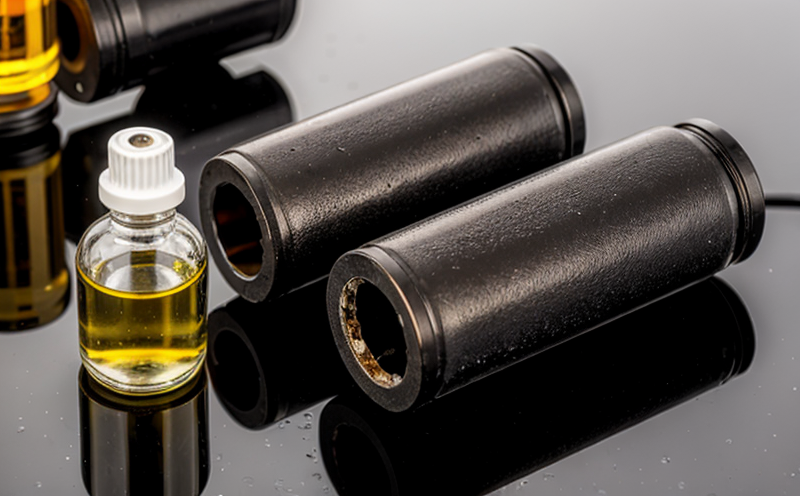ASTM D7679 Hydrocarbons Extended Range GC Test in Water
The ASTM D7679 standard method is widely recognized and utilized for measuring hydrocarbons in water samples, particularly those extended-range compounds. This test is essential for industries dealing with oil and gas, petrochemicals, and wastewater treatment plants to ensure compliance with environmental regulations.
This service provides comprehensive analysis of hydrocarbon content in water, focusing on compounds that are not easily detected by conventional GC methods but are critical to monitor due to their potential impact on the environment. The extended-range GC test is particularly useful for detecting low-level concentrations and identifying specific compound types within the oil and grease spectrum.
The ASTM D7679 method uses a combination of sample preparation techniques, including solvent extraction followed by thermal desorption, to concentrate hydrocarbons prior to analysis. This ensures that even trace amounts of contaminants are captured for accurate quantification. The test is conducted using state-of-the-art gas chromatography equipment capable of resolving complex mixtures of hydrocarbon compounds.
The primary objective of the ASTM D7679 method is to provide a reliable and precise measurement of total petroleum hydrocarbons (TPH) in water samples, which includes both non-polar and polar hydrocarbon fractions. This service is particularly valuable for industries that must adhere to strict environmental standards, such as those involved in oil spill cleanup, wastewater treatment, and process water monitoring.
The results of the ASTM D7679 test are reported according to the standard's guidelines, which specify the use of both mass-based (mg/L) and volume-based units for TPH. This dual reporting ensures that clients can interpret the data in a manner most relevant to their specific applications.
Our laboratory adheres strictly to ASTM D7679 protocols, ensuring accurate and consistent results every time. We employ highly skilled technicians and use cutting-edge equipment to perform these analyses with precision and reliability. The service also includes detailed reporting of all findings along with recommendations for corrective actions if necessary.
Understanding the impact of hydrocarbons on water quality is crucial not only from an environmental perspective but also in terms of operational efficiency within industrial processes. By leveraging this advanced testing methodology, clients gain valuable insights into their water management practices, helping them make informed decisions to minimize risks and enhance sustainability.
Applied Standards
| Standard | Description |
|---|---|
| ASTM D7679-18 | This standard specifies the procedure for determining total petroleum hydrocarbons (TPH) in water by gas chromatography. The method covers both non-polar and polar fractions of TPH, providing a comprehensive assessment. |
| ISO 16879:2015 | This international standard provides supplementary information on the use of gas chromatography for determining total petroleum hydrocarbons in water. It is often referenced alongside ASTM D7679. |
Scope and Methodology
| Aspect | Description |
|---|---|
| Sample Preparation | The ASTM D7679 protocol involves extracting hydrocarbons from water samples using a solvent, followed by thermal desorption of the concentrated compounds. This step is crucial for ensuring that all relevant hydrocarbon fractions are captured. |
| Instrumentation | The analysis is performed on an advanced gas chromatograph equipped with appropriate detectors and columns designed to separate various hydrocarbon components effectively. |
| Data Analysis | Results are analyzed according to ASTM D7679 guidelines, which specify the calculation of total petroleum hydrocarbons in mass-based (mg/L) and volume-based units. Additional interpretations are provided based on client requirements. |
Eurolab Advantages
Eurolab offers unparalleled expertise in hydrocarbon testing, leveraging decades of experience and cutting-edge technology to deliver accurate and reliable results. Our team of specialists ensures that every sample is handled with care and precision, adhering strictly to ASTM D7679 guidelines.
We provide comprehensive reporting services tailored to meet the needs of our clients, offering not just raw data but also actionable insights into their water quality issues. With a strong commitment to accuracy and customer satisfaction, Eurolab is your partner in achieving regulatory compliance and environmental stewardship.
Our state-of-the-art laboratory facilities are equipped with the latest instruments, allowing us to perform precise measurements even at trace levels of hydrocarbons. This capability ensures that we can detect potential contamination early, enabling timely interventions before they escalate into larger problems.
We also offer training sessions and consultation services to help our clients understand their test results better and implement effective strategies for maintaining water quality. Eurolab’s dedication to excellence makes us the go-to choice for hydrocarbon testing in the water sector.





